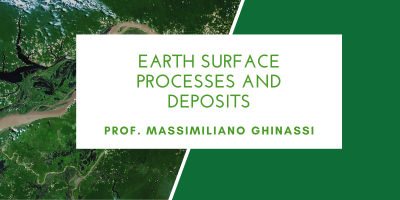Earth Surface Processes and Deposits

Period: first semester
Course unit contents:
1. SEDIMENT TRANSPORT AND FACIES ANALYSIS
landscape evolution from the catchment to a basin scale
Description of sediments: basic concepts
Tractional transport (bedforms) En-mass transport (debris flow-turbiditic currents) Erosive features Soft sediment deformations
2. SURFACE PROCESSES and REMOTE SENSING FOR
Remote sensing: theory and methods
Remote sensing: satellites and sensors
Conventional Aerial photographs
LiDAR and Structure From Motion technique
Digital Elevation Models: methods, sources, analyses
3. DEPOSITIONAL ENVIRONMENTS AND GEOMORPHOLOGICAL HAZARDS
3.1 Slope and upstream environments
Subaerial slopes, colluvial fans and alluvial fans
Geomorphological hazards in the mountain catchments
Landslide recognition and classification
4. FLUVIAL SYSTEMS
River styles, torrents, type of bars, overbank features
Fluvial geomorphology, between natural dynamics and anthropogenic activity
5. COASTAL SYSTEMS
Deltas, wave-dominated coasts, tide-dominate coasts
Coastal erosion and examples of coastal management
Evolution of alluvial and coastal plains during late Quaternary: deposits, landforms, soils
6. MARINE PROCESSES
Depositional systems from shelf to deep basin
Planned learning activities and teaching methods: The course will be based on class teaching, integrated with practices and field excursions. After dealing with the main topics of the course, a summary will be proposed through practices based on 3D outcrop models, interpretation of remote-sensed images and DEMs in GIS environments (QGIS, ArcMap, ENVI). Field trips which will focus on collection and discussion of data (stratigraphic logging and landform mapping) from different sedimentary successions and related depositional environments.
Teaching methods may be adapted to accommodate specific student needs (e.g., fieldwork limitations) provided that these needs are communicated to the instructor through the appropriate institutional procedures. Similarly, individual and flexible learning paths may be arranged for students with certified SEN or SLD, depending on feasibility and in accordance with institutional policies.
Students with specific learning disorders (SLD) or other conditions (including physical health, which may prevent full fruition of the module) are encouraged to contact the Student Service office (“Ufficio Servizi agli studenti - Settore Inclusione”), which can provide further information, support and learning tools.
At the end of the course, students will be invited to complete a survey aimed at collecting feedback and suggestions to support the improvement of future editions.
The use of AI tools is not allowed in any part/activity of the course.
